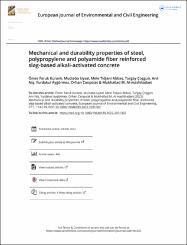Mechanical and durability properties of steel, polypropylene and polyamide fiber reinforced slag-based alkali-activated concrete

Göster/
Tarih
2023Yazar
Kuranlı, Ömer FarukUysal, Mücteba
Abbas, Mele Tidjani
Çoşgun, Turgay
Niş, Anıl
Aygörmez, Yurdakul
Canpolat, Orhan
Al-Mashhadani, Mukhallad M.
Üst veri
Tüm öğe kaydını gösterÖzet
Alkali-activated composites are significant materials in reducing CO2 emissions and ensuring sustainability. With the increasing concerns about climate change globally, the interest in alkali-activated materials has also
increased. Researching different fibers has very important potential in this
area. This study aims to make alkali-activated concretes widespread in the
concrete sector by using the materials common in conventional concretes
and ensuring that alkali-activated concretes are an alternative in terms of
sustainability. Experimental studies were conducted to examine the mechanical, durability, and microstructural properties (SEM) of slag-based alkaliactivated concrete (AASC) reinforced with three various fibers. The fibers,
polypropylene (PP), polyamide (PA), and steel (ST), were used with two
ratios (%0.4 and %0.8 by vol.). Compressive, splitting tensile, and flexural
strength tests were carried out at 28 and 90 days. In terms of durability
properties, the samples were exposed to high temperatures
(300–600–900 C) and freeze-thaw test (250 cycles). The results showed
that the addition of fibers improved the strength and durability properties;
for instance, the existence of steel and polypropylene fibers increased the
flexural toughness factor values by 430% and 260%, respectively.
Moreover, the compressive strength of the fibrous samples exposed to
900 C was obtained in the range of 6-23 MPa.
Cilt
27Sayı
1Bağlantı
https://hdl.handle.net/11363/5773Koleksiyonlar
Aşağıdaki lisans dosyası bu öğe ile ilişkilidir:

















